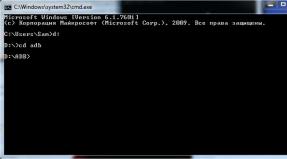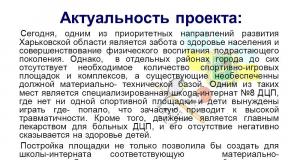Use of the living space. The concept and types of living quarters. The purpose of the dwelling and the limits of its use. Minors and use of living quarters
Violation of the limits established by law for the exercise of ownership of a residential premises entails the application to the owner of various types of liability measures provided for by law, for example, administrative in the form of a warning or a fine (, Code Russian Federation on administrative offenses), civil law in the form of deprivation of ownership of residential premises (Civil Code of the Russian Federation).
Article 7.21 of the Administrative Code of the Russian Federation:
Damage to residential buildings, residential premises, as well as damage to their equipment, unauthorized reconstruction and (or) redevelopment of residential buildings and (or) residential premises, or their misuse, entails a warning or the imposition of an administrative fine on citizens in the amount of one thousand to one thousand five hundred rubles. Unauthorized redevelopment of residential premises in apartment buildings shall entail the imposition of an administrative fine on citizens in the amount of two thousand to two thousand five hundred rubles.
Article 7.22 of the Code of Administrative Offenses of the Russian Federation:
Violation by those responsible for the maintenance of residential buildings and (or) residential premises, the rules for the maintenance and repair of residential buildings and (or) residential premises, or the procedure and rules for recognizing them as unsuitable for permanent residence and transferring them to non-residential premises, as well as reconstruction and (or) redevelopment residential buildings and (or) residential premises without the consent of the tenant (owner), if the reconstruction and (or) redevelopment significantly changes the conditions for using a residential building and (or) residential premises, entails the imposition of an administrative fine on officials in the amount of four thousand to five thousand rubles; for legal entities - from forty thousand to fifty thousand rubles.
Let's give an example of such a violation: an organization's use of an apartment as an office. The use of this kind is illegal, since the apartment is a residential area intended for the residence of citizens (, the Housing Code of the Russian Federation, the Civil Code of the Russian Federation). Accommodation in residential premises of enterprises and organizations is allowed only after its transfer to non-residential premises in accordance with the procedure established by housing legislation (Civil Code of the Russian Federation). If an organization nevertheless locates its office in a residential area, it can expect a number of adverse consequences:
Attention! When considering such cases, the plaintiff must prove to the court the very fact of using the dwelling for other purposes, systematic violation of the rights and interests of neighbors, or mismanagement of housing. Evidence can be, for example, witness testimony, protocols drawn up by employees of the internal affairs bodies, called in connection with a violation of the rules for the use of residential premises, acts of the body local government etc.
In addition to the above evidence, the court must provide evidence sending a warning to the owner about the need to eliminate violations.
Topics of questions
ATTENTION! SCALE CHANGES IN THE PROCEDURAL LEGISLATION! Military service. Legal advice Education Bidding (auctions, competitions) Receiving compensation, reimbursement of expenses Insurance. Legal advice The property. General issues Corporate disputes Order production. Legal advice Financial lease (leasing). Legal advice State (municipal) purchases. Legal advice Arbitration. Legal advice Legal expenses and legal advice Health. Sick leave payment. Legal advice Criminal process. Legal advice Calculators of state duty, interest, interest, compensation Tax audits. Taxes and fees. Legal advice Administrative disputes. Legal advice Building. Legal advice Recovery of damages, unjust enrichment. Compensation for harm. Legal advice Agreement: conclusion, termination, amendment, challenge. Legal advice Pension legislation. Legal advice Ownership: recognition, protection, restoration and termination. Legal advice Copyright. Legal advice Consumer rights Protection. Legal advice Administrative responsibility. Legal advice Equity participation agreement. Legal advice Inspections of organizations and individual entrepreneurs. Legal advice
In accordance with Art. 17 ZhK RF residential premises are intended for citizens.
The limits of the use of living quarters have always caused a lot of both theoretical and practical disputes. With the adoption in 2005 of the Housing Code of the Russian Federation, the disputes only intensified.
And this is quite understandable, given that the new Housing Code of the Russian Federation in a market economy fundamentally changed the approach to legal regulation issues of the use of living quarters.
As you know, a dwelling has such a property as its intended purpose, which ultimately predetermines the presence of numerous limits of its use. At the same time, the legislator allows for the expansion of the limits of the use of residential premises that go beyond the scope of its purpose.
Of course, the living quarters are intended and suitable for permanent residence of citizens. This is its main target characteristic. In this regard, the living quarters should be used only for permanent residence of citizens.
However, the legislation does not exclude the possibility of using residential premises for the purposes of temporary residence (for example, under a lease agreement for specialized residential premises, under a commercial lease agreement, under a gratuitous use agreement or on any other legal basis (Article 30 of the RF LC)) 1.
The use of residential premises is carried out taking into account the observance of the rights and legitimate interests of citizens living in this residential premises, neighbors, fire safety requirements, sanitary and hygienic, environmental and other legal requirements, as well as in accordance with the rules for the use of residential premises approved by the Government of the Russian Federation.
As follows from the Federal Law "Technical regulations on fire safety requirements" No. 123-FZ as amended. of 10.07.2010, electrical installations of buildings and structures must comply with the class of the fire and explosion hazard zone in which they are installed, as well as the category and group of the combustible mixture.
Cable lines and wiring for fire protection systems, means of ensuring the activities of fire protection units, fire detection systems, warning and evacuation control in case of fire, emergency lighting on evacuation routes, emergency ventilation and smoke protection, automatic fire extinguishing, internal fire water supply, elevators for transporting units fire protection in buildings and structures must remain operational in a fire for the time required to perform their functions and evacuate people to a safe area.
Horizontal and vertical channels for laying electrical cables and wires in buildings and structures must be protected from the spread of fire. In places where cable channels, ducts, cables and wires pass through building structures with a standardized fire resistance limit, cable penetrations with a fire resistance limit not lower than the fire resistance limit of these structures must be provided.
Cables from transformer substations of reserve power sources to input-distribution devices must be laid in separate fire-resistant ducts or have fire protection.
Distribution boards must have protection preventing the spread of combustion outside the board from the low-current compartment to the power compartment and vice versa.
Open cables must be flame retardant.
Emergency lighting luminaires on escape routes with autonomous power sources must be provided with devices to test their operability when simulating a disconnection of the main power source. The service life of an autonomous power source must provide emergency lighting along the escape routes during the estimated time of evacuation of people to a safe area.
Electrical equipment without means of fire and explosion protection is not allowed to be used in explosive, explosive and fire hazardous and fire hazardous premises of buildings and structures that do not have additional protective measures aimed at eliminating the risk of an ignition source in a combustible environment.
Explosion-proof electrical equipment is allowed to be used in fire-hazardous and non-flammable rooms, and in explosive rooms - provided that the category and group of the explosive mixture in the room correspond to the type of explosion protection of electrical equipment.
Automatic fire extinguishing and fire alarm systems must be installed in buildings and structures in accordance with the design documentation developed and approved in the prescribed manner.
The method of supplying a fire extinguishing agent to the fire site should not lead to an increase in the area of the fire due to the spill, splashing or spraying of combustible materials and to the release of flammable and toxic gases.
The design documentation for the installation of automatic fire extinguishing installations should provide for measures to remove the extinguishing agent from the room, building and structure after it is supplied.
Automatic fire extinguishing and fire alarm systems, depending on the algorithm developed during their design, should provide automatic fire detection, control signals supply to technical means of warning people about a fire and evacuation control, control devices for fire extinguishing installations, technical means of control of the smoke protection system, engineering and technological equipment. Automatic fire extinguishing and fire alarm systems should provide automatic notification of the personnel on duty about the occurrence of a malfunction of communication lines between individual technical means included in the installations.
Fire detectors and other fire detection means must be located in the protected area in such a way as to ensure timely fire detection at any point in this room.
Fire alarm systems must provide light and sound signals of a fire to the receiving and control device in the premises of the personnel on duty or to special remote warning devices.
Manual fire detectors should be installed on escape routes in places accessible for their activation in the event of a fire.
Requirements for the design of automatic fire extinguishing installations and automatic fire alarm systems are established by this aforementioned federal law and (or) fire safety regulations.
Alerting people about a fire, managing the evacuation of people and ensuring their safe evacuation in the event of a fire in buildings and structures should be carried out in one of the following ways or a combination of the following methods:
1) supply of light, sound and (or) speech signals to all rooms with permanent or temporary stay of people;
2) broadcast of specially developed texts on the need for evacuation, evacuation routes, direction of movement and other actions to ensure the safety of people and prevent panic in case of fire;
3) placement and provision of illumination of fire safety signs on the escape routes during the standard time;
4) the inclusion of evacuation (emergency) lighting;
5) remote opening of emergency exit doors locks;
6) provision of communication between the fire post (control room) and areas for alerting people about a fire;
The internal fire-fighting water supply system must provide the standard water consumption for extinguishing fires in buildings and structures.
An internal fire-fighting water supply system is equipped with internal fire hydrants in an amount that ensures the achievement of fire extinguishing goals.
According to Art. 23 Federal law dated March 30, 1999 No. 52-FZ (as amended on June 25, 2012) "On the sanitary and epidemiological well-being of the population"
living quarters in terms of area, layout, illumination, insolation, microclimate, air exchange, noise levels, vibration, ionizing and non-ionizing radiation must comply with sanitary rules in order to ensure safe and harmless living conditions, regardless of its duration.
I would like to cite a common life story described on one of the forums: “Recently I got stuck in an elevator. I press all the buttons - nothing works. Looked around: inside it is not written what number to call the elevator. Is this not a violation? Otherwise, I had to drum loudly on the doors for a long time, because the entrance was a stranger, and I didn't want to call and ask for help from my relatives, who are located in a completely different part of the city and it is not known when they will be able to come and rescue me from there. "
In this case, the answer is unequivocal - yes, the lack of contact information is a significant violation, since in accordance with the Resolution of Gosgortekhnadzor "On Approval of the Rules for the Construction and Safe Operation of Elevators", the rules for using the elevator are posted in the cab and the main landing floor, as well as a sign indicating the phone number to communicate with service personnel and emergency services.
Also, in accordance with Art. 10 of the Law of the Russian Federation "On Protection of Consumer Rights" establishes a list of mandatory information that must be provided by the service provider. The controlling body for not providing information about the provider of services is Rospotrebnadzor, where a complaint must be sent.
Another example of expanding the limits of the use of residential premises is Part 2 of Art. 17 of the RF LC, according to which it is allowed to use living quarters for the implementation of professional activity or individual entrepreneurial activity of citizens living in it legally, if this does not violate the rights and legitimate interests of other citizens, as well as the requirements that the living quarters must meet.
At the same time, a number of authors refer to the activities of doctors in private practice, teachers, writers, researchers, musicians, poets, photographers, artists, auditors, lawyers, tailors, etc. ... At the same time, the implementation of such activities has criteria: observance of the rights and interests of neighbors, fulfillment of requirements for the level of noise, radiation, etc.
It should be noted that in addition to professional activities, Part 2 of Art. 17 of the RF LC also includes individual entrepreneurial activity as allowed for implementation in a residential building. At the same time, the use of residential premises as an office for staff accommodation legal entity still prohibited 1. Accommodation in residential premises of enterprises, institutions, organizations is allowed only after the transfer of such premises to non-residential (clause 3 of article 288 of the first part of the Civil Code of the Russian Federation dated November 30, 1994, No. 51-FZ (hereinafter referred to as the Civil Code of the Russian Federation)).
Until May 2002, housing and civil legislation did not provide for the use of residential premises for other purposes at all, i.e. not for citizens' residence. The use of housing for other purposes entailed corresponding consequences. For example, Art. 98 LCD of the RSFSR and Art. 293 of the Civil Code provided for the eviction of citizens from the dwelling for this offense (clarification should be made here - the norms of the Civil Code of the Russian Federation continue to apply).
In December 2002. Art. 10 of the earlier existing housing estate of the RSFSR was supplemented with two parts, which provided for the possibility of placing a lawyer's office in a residential area. Article 21 of the Federal Law of May 31, 2002. 63-FZ "On advocacy and the legal profession in the Russian Federation" (as amended on November 21, 2011), the right of an advocate to individually establish a lawyer's office to carry out advocacy activities is enshrined (as one of the forms of advocacy formations along with the bar association, etc. ), as well as the right to use residential premises for these purposes. This addition to the JK of the RSFSR did not contain specific instructions as to which living quarters occupied by a lawyer and his family members could be used as a lawyer's office. Consequently, it became possible to place a lawyer's office not only in a separate apartment, but also in a room in a communal apartment where the lawyer and his family live, which significantly worsens their living conditions, and also creates inconveniences for neighbors.
Now, on the basis of part 2 of Art. 17 of the Housing Code of the Russian Federation, the use of housing not for living was no exception, but general rule... In essence, the wording about the possibility of using housing for the implementation of "professional and individual entrepreneurial activity" hardly has any limits. The only exception is the ban on the placement of industrial production in residential premises (part 3 of article 17 of the RF LC). This prohibition is contained in the law in order to ensure compliance with the requirements that apply to residential premises. According to V.T. Batychko, edition of part 3 of Art. 17 ZhK RF is not entirely successful, which is explained by the following factors.
By industry is meant a branch of production that encompasses the processing of raw materials, the development of mineral resources, the creation of means of production and consumer goods.
As you can see, the objects where the location of industrial production is prohibited differ: in one case, these are residential buildings, and in the other, residential premises. For this reason, the provisions of these articles are interpreted in different ways. So, for example, on the one hand, A.D. Kulikov defines a ban on the placement of industrial production in residential buildings as a whole, i.e. both in residential and non-residential premises that may be located in such a house.
On the other hand, as noted by A.A. Titov, if we are guided by the wording of Part 3 of Art. 17 of the RF Housing Code (accommodation in residential premises of industrial production is not allowed), then, taking into account the norms of Art. 16 of the RF LCD, it can be concluded that industrial production can be located in an apartment building in a non-residential premises.
But P.V. Makeev believes that industrial production cannot be located not only in residential premises: a residential building, apartment, room, but also in non-residential premises in an apartment building, and in premises that are part of the common property in an apartment building, explaining this by the fact that in st. 35 of the Town Planning Code of the Russian Federation of December 29, 2004. No. 190-FZ in the residential and public business area, in which housing facilities are located: residential and apartment buildings, production facilities (industrial, communal storage and other production facilities) should not be located.
The use of residential premises is carried out taking into account the observance of the rights and legitimate interests of citizens living in this residential premises, neighbors, fire safety requirements, sanitary and hygienic, environmental and other legal requirements, as well as in accordance with the Rules for the use of residential premises approved by the Government of the Russian Federation from January 21, 2006 No. 25 (part 4 of article 17 of the RF ZhK). From chapter 2 of article 10 of these Rules it follows:
As a user of the living quarters, the tenant is obliged to:
a) use the dwelling for its intended purpose and within the limits established by the Housing Code of the Russian Federation;
b) to exercise the use of the residential premises, taking into account the observance of the rights and legitimate interests of citizens living in the residential premises, neighbors;
c) ensure the safety of the dwelling, prevent the performance of work in the dwelling or the commission of other actions leading to its damage;
d) maintain the proper condition of the living quarters, as well as common areas in an apartment building (apartment), maintain cleanliness and order in the living quarters, entrances, elevator cabins, stairwells, in other common areas, ensure the safety of sanitary and technical and other equipment, as well as comply with the requirements of paragraph 6 of these Rules;
e) immediately take possible measures to eliminate the detected malfunctions of the living quarters or sanitary-technical and other equipment located in it, and, if necessary, notify the renter or the appropriate management organization about them;
f) carry out current repairs of living quarters;
g) make timely payments for housing and utilities. The obligation to pay for residential premises and utilities arises from the moment of the conclusion of a social rental agreement for residential premises in accordance with the law;
h) inform the landlord, within the time limits established by the contract of social lease of residential premises, about changes in the grounds and conditions affecting the use of residential premises;
i) admit, at a pre-agreed time, the landlord's employees or persons authorized by him, representatives of state control and supervision bodies to inspect the technical and sanitary condition of the residential premises, sanitary and other equipment located in it, as well as to perform the necessary repair work ;
j) not to carry out the reconstruction and (or) redevelopment of the living quarters in violation of the established procedure;
k) upon termination of the right to use the dwelling, surrender the dwelling, sanitary and technical and other equipment in it in good condition to the lessor under an act, pay the cost of the repair of the dwelling, sanitary and technical and other equipment in it, not made by the tenant, or make repairs at your own expense, as well as pay off arrears in payment for housing and utilities.
In this regard, it should be noted that the provision of Part 4 of Art. 17 ZhK RF has a declarative character, but in reality new order the use of housing creates grounds for numerous violations of the rights and interests of not only citizens, but also other persons, for example, legal entities (organizations), foreign citizens and stateless persons.
Neighbors are using the living space for other purposes
Residents use the living space for other purposes. The dwelling is intended for the residence of citizens; it is not allowed to be accommodated in residential premises of industrial production and to carry out entrepreneurial activities without observing the conditions stipulated by the legislation of the Russian Federation (Article 288 of the Civil Code of the Russian Federation, Article 17 of the LC RF).
An example of a court proceeding in a case of misuse of premises
Parties to the case
So, for example: the decision of the Kuibyshevsky District Court of Irkutsk dated November 17, 2011 No.

Litigation in the case of misuse of premises
The representative of the plaintiff Kirilchuk N.N. at the hearing she supported the claim, insisted on its satisfaction. The court explained that the plaintiff is the owner of residential premises intended for permanent residence of citizens, but uses them for other purposes - as a hotel, violating the rights and interests of the owners of other residential premises of the apartment building.
 In addition, the defendant made a redevelopment of residential premises in violation of the requirements of sanitary, building, fire regulations, without receiving proper approvals and permission from the local self-government body. The defendant was given an order to restore the premises in their previous form, not executed by the owner, and the defendant was also brought to administrative responsibility for unauthorized redevelopment and reconstruction of residential premises. Since the redevelopment was made in violation of the SanPiN requirements for residential premises, it is impossible to preserve the redevelopment, due to which the counterclaims cannot be satisfied.
In addition, the defendant made a redevelopment of residential premises in violation of the requirements of sanitary, building, fire regulations, without receiving proper approvals and permission from the local self-government body. The defendant was given an order to restore the premises in their previous form, not executed by the owner, and the defendant was also brought to administrative responsibility for unauthorized redevelopment and reconstruction of residential premises. Since the redevelopment was made in violation of the SanPiN requirements for residential premises, it is impossible to preserve the redevelopment, due to which the counterclaims cannot be satisfied.
Defendant Kress T.A. did not appear at the hearing.
The representative of the defendant Pykhtin A.The. at the hearing did not admit the claim.
After listening to the parties, examining and evaluating the evidence presented, the court considers the claim of the Irkutsk administration to be satisfied.
According to the provisions of Art. 15 ZhK RF the objects of housing rights are residential premises. Residential premises are considered to be isolated premises, which are immovable property and are suitable for permanent residence of citizens (meets the established sanitary and technical rules and regulations, other legal requirements).
In accordance with paragraph 2 of Part 1 of Art. 16 ZhK RF the apartment belongs to the living quarters. Part 3 of the named article states that an apartment is a structurally separate room in an apartment building, which provides direct access to common areas in such a building and consists of one or more rooms, as well as auxiliary rooms intended to satisfy citizens' household and other needs. associated with their living in such a separate room.
In accordance with Part 1, 2, Art. 209 of the Civil Code of the Russian Federation, the owner owns the rights to own, use and dispose of his property. The owner has the right, at his discretion, to perform any actions with respect to the property belonging to him that do not contradict the law and other legal acts and do not violate the rights and interests of other persons protected by law, including alienate his property into the ownership of others, transfer to them, while remaining the owner, the rights possession, use and disposal of property, pledge property and burden it in other ways, dispose of it in a different way.
The court found that Kress T.A., being the owner of living quarters in a communal apartment, without transferring the premises from the housing stock, uses these living quarters not for their intended purpose, but as a hotel. In addition, the defendant made alterations in the apartments in violation of the requirements of sanitary and construction legislation.
According to Art. 17 of the Rules for the Use of Residential Premises, approved by the Government of the Russian Federation No. 25, the owner of a residential area in an apartment building uses the residential area for its intended purpose and within the limits established by the RF Housing Code.
In accordance with clause 10 of the PP of the RF Armed Forces N 14 "On some issues that have arisen in jurisprudence when applying the RF Housing Code "the law establishes the limits of the exercise of ownership of the residential premises, which consist in the fact that the owner is obliged to: use the residential premises for their intended purpose, that is, for the residence of citizens (Part 1 of Art. 17 of the RF LC, Clause 2 of Art. 288 of the Civil Code of the Russian Federation). The use of residential premises for the implementation of professional activities or individual entrepreneurial activities is allowed in compliance with the provisions established by parts 2 and 3 of article 17 of the RF LC, paragraph 3 of article 288 of the Civil Code of the Russian Federation. residential premises entail the application to the owner of various kinds of liability measures provided for by law, for example, administrative in the form of a warning or a fine (Article 7.21, Article 7.22 of the Code of Administrative Offenses of the Russian Federation), civil law in the form of deprivation of ownership of the residential premises (Article 293 of the Civil Code of the Russian Federation ).
Art. 293 of the Civil Code of the Russian Federation states that if the owner of the residential premises uses it for other purposes, then the local government can warn the owner about the need to eliminate violations, and if they entail the destruction of the premises - also assign the owner a proportionate period for repairing the premises (paragraph 1). If the owner, after a warning, continues to violate the rights and interests of neighbors or use the dwelling for other purposes or does not make the necessary repairs without good reason, the court, upon the claim of the local government, may decide to sell such a dwelling at a public auction with payment to the owner of the proceeds from the sale. less the costs of the execution of the judgment (paragraph 2).
The Housing Code defines the purpose of using the dwelling - the residence of citizens. The basic law of the Russian Federation - the Constitution of the Russian Federation determines that “everyone who is legally on the territory of the Russian Federation has the right to move freely, choose a place of stay and residence” (Article 27). Article 20 of the Civil Code of the Russian Federation determines the place of residence where the citizen permanently or predominantly resides. Accordingly, the place of stay is the place of temporary residence of citizens.
Based on the specified purpose of the residential premises, housing rights and obligations, the object of which may be a room, apartment (part of an apartment), residential building (part of a residential building), may arise from a lease agreement for residential premises, a contract for gratuitous use, a lease agreement (if a residential premises serves as the place of residence of the participant in housing relations) and from any other legal basis. The basis for the permanent residence of citizens may be their permanent registration at the location of the dwelling.
The living quarters have a strictly designated purpose. Residential premises are intended exclusively for the residence of citizens, and the exercise of the owner's rights to own, use and dispose of such real estate objects should be carried out in accordance with the intended purpose of these things. A citizen - the owner of a residential building, privatized apartment or other residential premises has the right to use them for personal residence and residence of his family members, as well as alienate these things and lease them for temporary use to other persons only for similar purposes.
Thus, it is not allowed to use them not for living without first transferring these premises to the category of non-residential, i.e. without changing their intended purpose (which, in turn, requires a corresponding re-registration of them with the authorities that register this type of real estate).
The use of residential premises for other purposes, or a systematic violation by the owner of such premises of the rights and interests of neighbors, or the owner's mismanagement of his apartment may become the basis for a court to take a decision on the sale of such residential premises at a public auction at the suit of a local government body, i.e. on the compulsory alienation of the property belonging to the owner.
The requirement to use the dwelling for its intended purpose is contained in both housing and civil legislation.
According to Art. 67 of the Housing Code of the Russian Federation, a tenant of residential premises under a social tenancy agreement is obliged to use housing for its intended purpose and within the limits established by the Housing Code of the Russian Federation. Violation of such a duty entails termination of the contract and eviction without providing another living quarters (Article 83 of the LC RF).
Article 678 of the Civil Code of the Russian Federation establishes the obligation of the tenant of a dwelling under a commercial lease to use it only for living. In the event that the housing is not used for its intended purpose, the lessor has the right to terminate the rental contract in court.
According to Art. 30 of the RF LC, the owner of a residential premises exercises the right to own, use and dispose of the residential premises belonging to him in accordance with its purpose and the limits of its use. Misuse by the owner of the property for other purposes may result in the sale of the property at a public auction (by a court decision) with the payment to the owner of the proceeds from the sale minus the costs of enforcing the judgment.
The tenant of a dwelling can transfer it to a citizen under a sublease agreement, the owner - under a lease agreement. But at the same time, the requirements of Art. 17 ZhK RF - the use of housing for citizens.
If the dwelling is not used for its intended purpose, it is envisaged to terminate housing tenancy agreements and evict citizens in cases of systematic violation of the rights and interests of neighbors, which indicates the need to prevent such violations.
According to Art. 293 of the Civil Code of the Russian Federation, the use by the owner of his home for other purposes may lead to its compulsory seizure.
The general purpose of a dwelling is to live in it for citizens.
An exception to this rule is established in clause 2 of Art. 17 of the RF LC, according to which the residential premises can be used for professional or individual entrepreneurial activities.
Under the entrepreneurial activity of citizens is meant an independent activity carried out at their own risk, aimed at systematic profit from the use of property, the sale of goods, the performance of work or the provision of services by persons registered in this capacity in the manner prescribed by law 5.
Entrepreneurial activity can be carried out by both legal entities and citizens. As the location of a legal entity (its legal address), a residential premises belonging to one of its founders by right of ownership can be used, with the consent of all persons living in it, but only if this premises will not be used in violation of rights and interests persons and neighbors living in it, as well as in violation of sanitary and technical rules and regulations, other legal requirements for living quarters, that is, for example, in such an apartment there will be no production workshop household chemicals or an evening club. However, the dwelling indicated as a legal address may well be used, for example, as an office, as sometimes notaries, teachers or lawyers use dwellings.
Thus, the dwelling can be used for making a profit by persons registered in the manner prescribed by law for this. In other words, a dwelling can be rented out, under a lease agreement or on another legal basis, by the owner of such a dwelling for its use by persons (tenants or tenants) for its intended purpose - residence or for the purpose of making a profit, but without violating the procedure for using dwellings established by law. premises.
For this use of the living space, the following conditions must be met. Firstly, for professional or entrepreneurial activities, residential premises can only be used by citizens legally residing in it.
Secondly, the use of residential premises for professional or entrepreneurial activities is allowed, provided that the rights and legitimate interests of other citizens are not violated.
Thirdly, the use of residential premises for professional or entrepreneurial activities should not create preconditions for violating the requirements for residential premises, which are established by the Government of the Russian Federation.



















